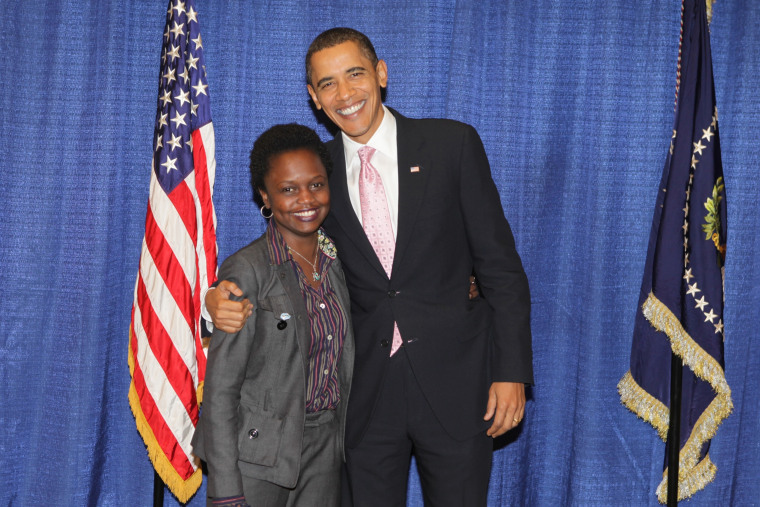Throughout my almost two decades working in politics, I’ve held several jobs, ranging from grassroots activism to local politics, and working in the White House. I didn’t take the traditional route to get there; I was born in Martinique, grew up in an immigrant household in New York, and initially thought I was going to become a doctor.
Throughout my non-linear career, I’ve learned to tap into my inner power – particularly when I worked in the White House under President Obama. Below, I share three lessons I learned, in hopes that they will help you embrace what makes you unique, find your voice and know your value.
1. Find out what makes you motivated, not what motivates everyone else.
I had a job many in Washington D.C. would kill for. It was 2008, and I was working for the Department of Labor as a White House liaison right after President Obama was elected for his first term. My job was to make sure the department transitioned over smoothly to the new administration after President Bush left office. It was a coveted job, and I was so excited to have landed a job working for the Obama administration. The only problem? It just wasn’t right for me.
While working on the Obama campaign as the southern political director, I had become used to long hours and the incredibly fast-paced environment where anything could change in a moment. In fact, I learned not only to put up with it, but to love it. The speed and go-go-go nature of the campaign thrilled me and kept me motivated.
RELATED: Karine Jean-Pierre: How I overcame self-doubt and found resilience
Transitioning back to a normal 9-to-5 job, which so many people love, just wasn’t working for me. I missed the rush of the campaign, the thrill of it all. And, I realized, that’s the kind of environment I was better suited to work in. So, when an opportunity to switch to a team inside the White House that operated more like a campaign, I took it. I left a job many would have loved for a job I loved. And it made all the difference. My takeaway? Whether it’s a job or life choice, make sure you’re figuring out what makes you motivated, not what motivates everyone else.
2. Don’t hide from what makes you unique, embrace it.
I’m not your typical person working in politics. I didn’t get an early start in politics, I didn’t “always know” I wanted to be in politics, and my family didn’t instill an early fascination with politics. I didn’t even get started in politics until my mid-20s (which probably sounds early to you, but compared to all the people who’ve known they want to be in politics since they were kids, it’s late!). And now that I do work in politics, I’ve realized that’s OK. It might even be a good thing.
I’ve learned what sets you apart from everyone else makes you unique. For me, that’s my background (or lack of background in politics). Getting a late start meant that once I knew this was what I wanted to do, I had to work twice as hard to catch up. I had to make sure I knew my industry. Trying out a few other potential career paths also made me doubly sure I had found the right one once I stumbled upon politics.
Don’t just take it from me. We can all learn from the 2018 midterm elections, with its record number of women being elected to Congress from all walks of life. They showed us that it’s never too late to get started.
There are a lot of things that I do differently than other folks who work in politics. For one, I keep a Rolodex (yes, a real-life, physical Rolodex!) with the names and numbers of those I’ve worked with and come across. It’s not the norm these days, but it’s also helped me in key moments in my career and been a game-changer for me.
Along the way, I could’ve dropped these quirks (gotten rid of my Rolodex, hidden my late start in politics, for example). But I’ve found that these quirks have actually made me better at my job, not worse. I love my Rolodex and I’m proud of my (relatively) late start in politics. Don’t erase what makes you unique, embrace it.
3. Lead by example
When I was working for President Obama, there were a few key mantras our team followed. Always be prepared and do your homework: know your stuff. Respect the office that you hold, and the people that you serve. When you work for the President, you also work for the people. And always, always, always: stay calm and stay grounded.
Now, to be clear, no one ever told us to act like that. But that’s how President Obama acted, and we followed his example. When I’d go out to the states to meet with everyday folks, they’d always remark upon President Obama’s temperament and how even-keeled he was. They’d tell us we were even-keeled, too. And that’s when I realized it: President Obama was leading by example. He taught us to be respectful and remember who we served —the people —because that’s how he always carried himself. He showed us what a good public servant looks like because he was a good public servant.
Karine Jean-Pierre's roots are in politics, from grassroots organizing to working on presidential campaigns. She worked in the Obama White House, managed political campaigns nationally and locally, and now serves as a political analyst for MSNBC, the chief public affairs officer for MoveOn, and teaches at Columbia University's School of International and Public Affairs. Her book "Moving Forward" is out now.
